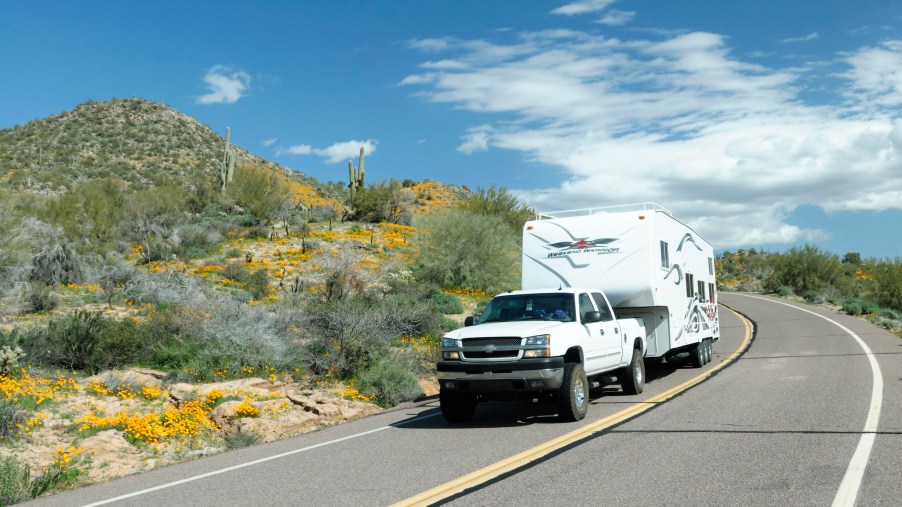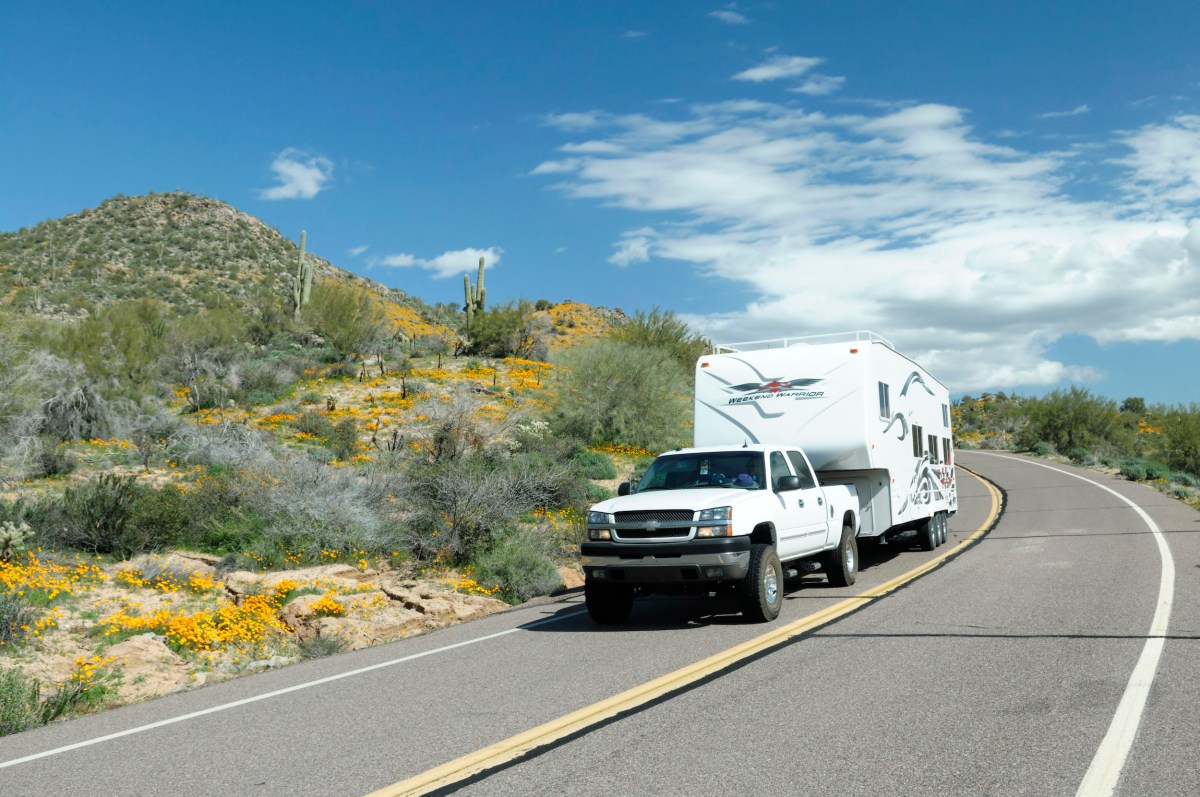
What Is a Fifth-Wheel Hitch and Does Your Pickup Need One?
You may have heard the terms “5th wheel” or “fifth-wheel hitch” for the first time in the context of RV camping trailer types. Fifth-wheel campers are loosely situated between the luxurious Class A bus-type RVs and the smaller bumper-pull travel trailer RVs based on size, expense, and livability. So what is a fifth-wheel hitch, and can you add one to your pickup truck?
What is a fifth-wheel hitch?
An article from J.D. Power describes the fifth-wheel hitch as “a popular system for towing large, heavy campers” where the towing vehicle acts as the four-wheel-equipped trailer’s “fifth-wheel,” providing extra stability.
Fifth-wheel hitches use a hinged solid steel plate shaped like a horseshoe mounted on a rack, with the horseshoe opening facing rearward, that bolts to your pickup truck’s bed over the truck’s rear axle.
A heavy steel kingpin mounted on the trailer slides into the horseshoe and locks into place for towing, allowing the truck to carry a portion of the trailer’s weight (trailer hitch weight) over the truck’s rear axle.
What is the difference between a gooseneck hitch and a fifth-wheel hitch?
Like fifth-wheel hitches, gooseneck hitches mount in the truck bed directly over the truck’s rear axle for towing large, heavy trailers. However, a gooseneck hitch uses a hitch-ball in the truck bed, and the trailer coupler attaches to it much like the more common “bumper-pull” type. Gooseneck hitches are found on trailers used for industrial purposes and hauling livestock with the rare RV application.
Can I add a 5th wheel hitch to my truck?
Yes, you can add a fifth-wheel hitch to your truck. But it is essential to remember your truck’s payload capacity and gross combined weight rating (GCWR). Look inside your truck’s door or owner’s manual for these numbers. Your truck’s payload capacity is the total weight of everything added to it, like people, trailer hitches, and attached trailer hitch weight, while GCWR is the combined weight of the truck, trailer, and contents of both.
A fifth-wheel hitch weighs between 60 and 200 pounds, and a light-weight “half-ton towable” fifth-wheel camper has at least 1,100 pounds of hitch weight. After adding your family and camping supplies, these weights quickly exceed most half-ton pickup’s payload capacity. Larger, one-ton pickups with dual rear wheels have increased payload and GCWR capacities.
More on installing this hitch

Quality fifth-wheel hitches range from $500 to $1,000 or more, about the same as a quality weight-distribution hitch used for towing a large “bumper-pull” camper. Installing a fifth-wheel hitch is a straightforward DIY project, but it requires measuring locations and drilling holes into your truck bed.
Follow the instructions included with your new fifth-wheel hitch to locate the front rail and drill pilot holes at the required bolt hole locations after you’ve removed your spare tire and any affected heat shields from under the truck. Line up the under-bed brackets to the pilot holes to ensure proper alignment before drilling all the front rail holes to full size. After deburring the holes, apply touch-up paint to prevent corrosion and bolt the front rail into place.
Determine the required hitch height and assemble the hitch head and hitch legs appropriately to achieve the correct height. Use this assembly to locate the rear hitch rail and pilot drill the mounting holes before drilling them full size. Deburr and paint the rear rail holes before installing the bolts and torquing all the fasteners to spec according to your hitch’s instructions.
Is a fifth-wheel hitch worth it?
Yes, a fifth-wheel hitch is worth it as it is required for towing a 5th wheel trailer. As a general rule, 5th wheel campers offer more livable space and amenities such as clothes washing machines, and dryers. Also, fifth-wheel trailers often provide a better towing experience with more stability and maneuverability. However, fifth-wheel hitches require more maintenance than other hitch types with required tasks like applying lubrication and removing old grease to prevent attracting dirt that shortens the hitch’s expected lifespan.



